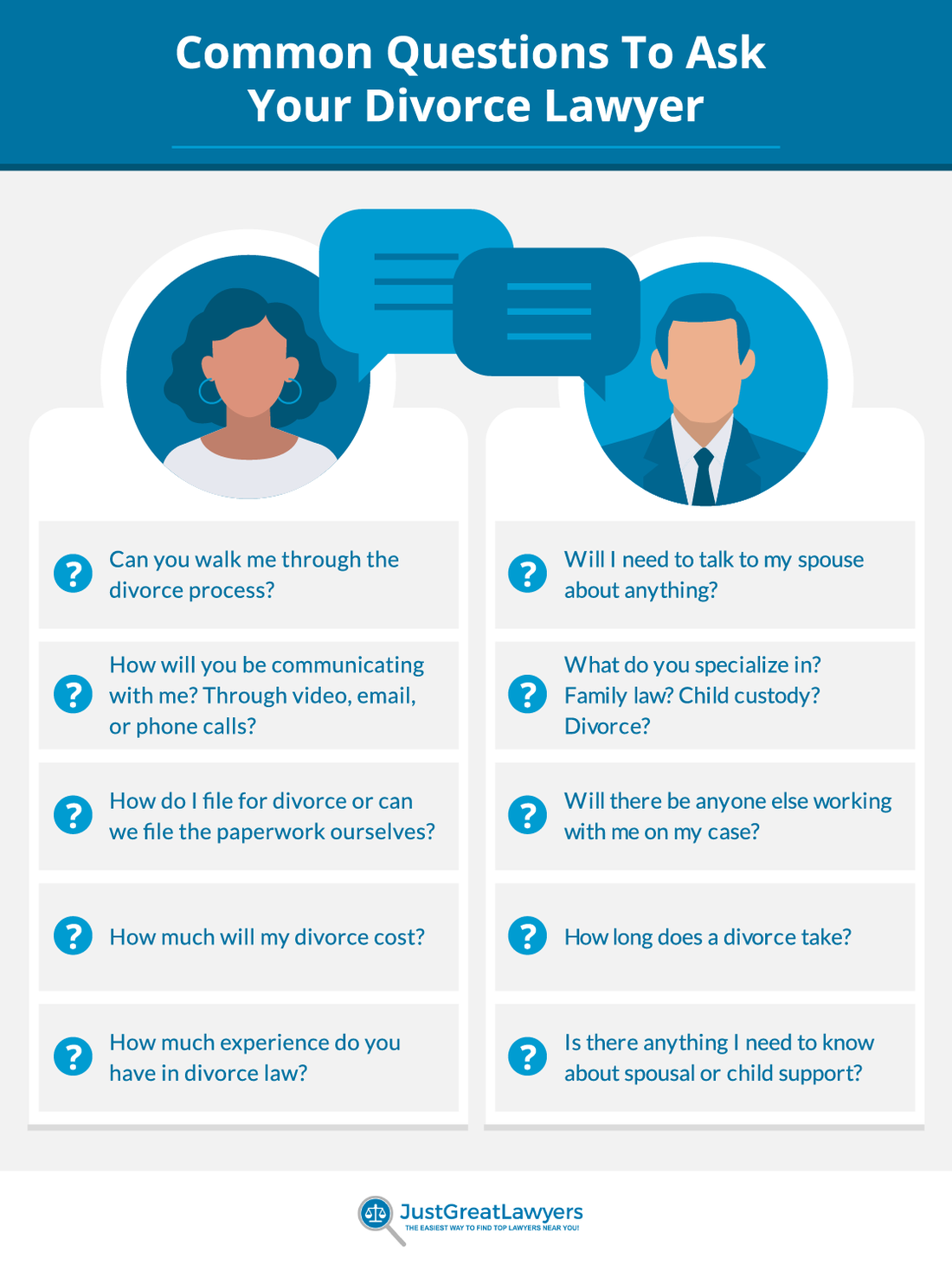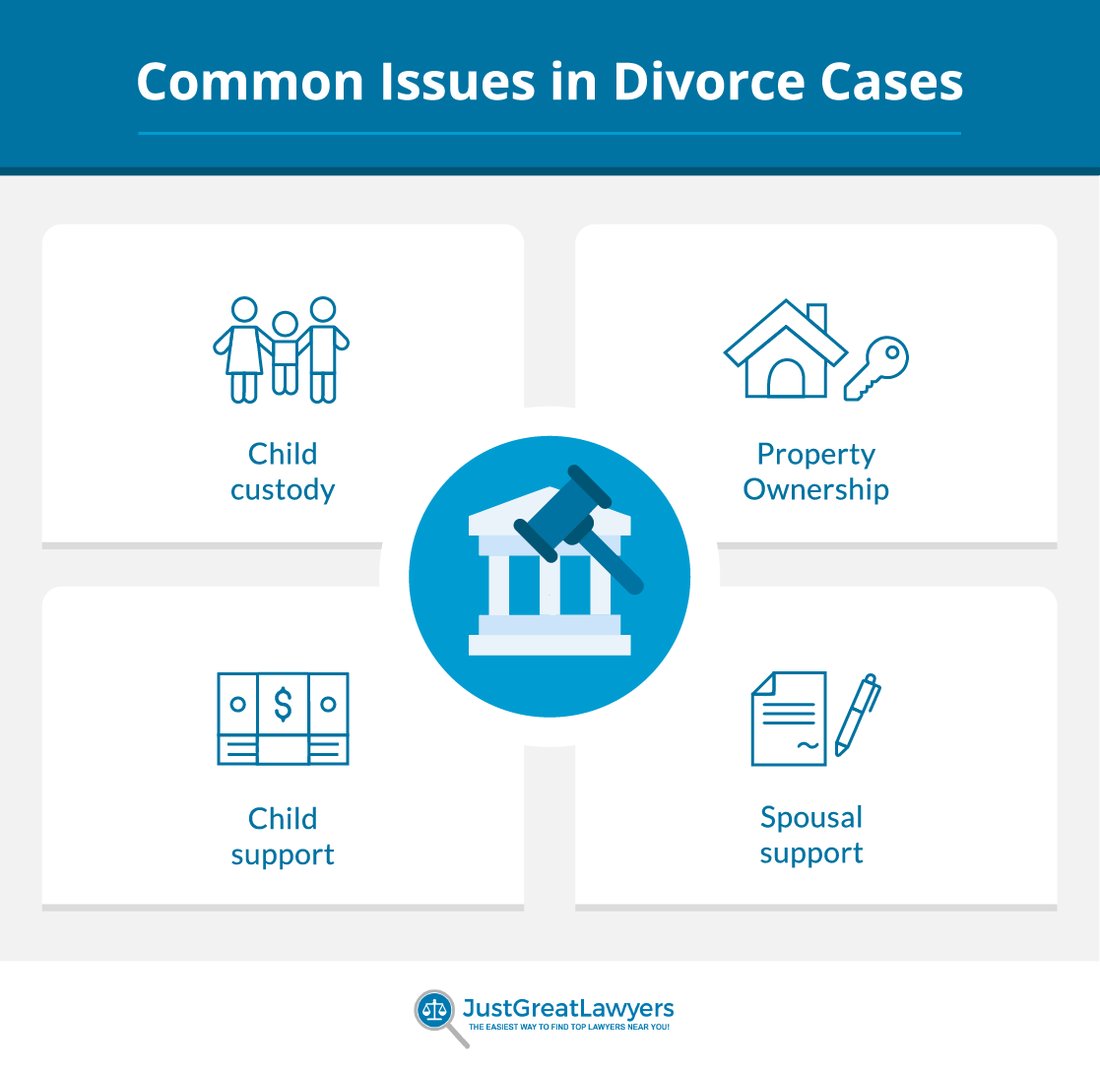
Reaching out for an initial consultation with a divorce lawyer can seem intimidating. There are a lot of factors to consider and you may not know what questions to ask.
It’s a good idea to go in prepared so you can understand how an attorney can help you navigate the divorce process and if they’re a good fit for your needs. Here is a list of questions to ask a divorce lawyer during your first meeting to better understand the divorce process and their qualifications.


Experience counts. Oftentimes, a lawyer’s or law firm’s qualifications are listed on their website, but ask what their specialty is. Are they most familiar with divorce law, family law cases, or another area? Once you find out what their specialty is, find out how much experience they have. How many and what types of divorce cases have they handled? Have they been able to get them settled out of court?
If you have children and custody is at issue, you will want a family law attorney with experience handling child custody cases. If you are concerned about spousal support, you’ll want a lawyer who has experience in handling those kinds of cases.
You’ll want to ask what you and your spouse will go through in the divorce process. How much will it cost, including filing fees? How long will it take? What steps will you need to go through?
If you think your divorce case might go to trial, you can ask the attorney about how a judge is likely to decide your case. This is another reason it’s helpful to know the lawyer you’re consulting has experience in the type of divorce case you may be filing. They’ll know about the laws of your state and how courts most frequently decide issues such as the division of property, child custody, child support, and spousal support in cases such as yours.
Give the lawyer you’re consulting the information about your case, such as whether you expect it to be contested, and ask how long your divorce process is likely to take in the state where you’re filing.
There are several different kinds of divorce cases. Describe how you wish to proceed and ask the lawyer which categories may apply to your preferred approach. Do you expect your case to be an at-fault or no-fault case? Are you open to mediation or arbitration? Will you consider a collaborative divorce, in which attorneys for both parties work together to resolve the case amicably? These are some questions you may want to discuss to determine the best path forward.
Depending on your case type, you may ask if there are settlement agreements you may have to make. A marital settlement agreement allows spouses who are divorcing to agree to the terms of their divorce. Such an agreement is a legally binding document that can touch on a range of topics, from spousal support (alimony) to child visitation (parenting time), to property distribution. This may involve a process of offers and counteroffers with you and your spouse. It’s a good idea to ask the lawyer how this process will work.
You might want to ask how the negotiation process will play out depending on how each spouse takes it. The lawyer you’re speaking with should have experience in such negotiations, so they can tell you what to expect.
The attorney you speak with might not be the only one working on your case. Consider asking whether other attorneys or people might be participating, and what services they might be performing, if you decide to retain the lawyer. Is the attorney you’re consulting part of a large law firm? How much of the case would be delegated to other people in the office, such as paralegals, and how much will the attorney be doing personally?
Divorces can prove costly: Both the process of divorce and the ultimate settlement or court ruling can have a significant financial impact on both parties. With this in mind, you should ask about the financial cost of the divorce so your attorney can assist you in meeting your needs.
As of 2020, the average cost of divorce was $12,900, but those costs varied considerably depending on the kind of case involved. An uncontested divorce with no major issues costs an average of $4,100, but divorces that went to trial on two or more issues cost far more: an average of $23,000.
You may ask about the rough total cost of the divorce, including the fees. Filing fees will vary from state to state (for instance, they were just $75 in North Carolina in 2020, but $435 in California), and attorney’s fees will vary from office to office. Be sure to ask what you will be getting for your money and what the most costly elements of your divorce will likely be.
You may ask how much the attorney you’re consulting charges per work hour. Ensure everything is transparent regarding what you are getting charged for; ask for the specific services they provide and how long they generally take. As a point of reference, the average hourly rate for a divorce attorney in 2020 was $270, but about 1 in 10 (11%) of clients said their attorneys charged $100 an hour, and 2 in 10 said they paid $400 or more.
You will want to know how you would get billed, what kinds of payment they accept, and so forth. Do they take credit cards, for instance, and when will they need payment? At what point will you have to pay?
Are there any additional fees that may come along with the divorce process? Is there a retainer fee in addition to the hourly fee?
It will depend on your spouse’s actions and behavior. Lawyers commonly bill at an hourly rate which means longer battles over your spouse, children, or other personal issues can result in more fees and costs.
In most cases, each spouse will be responsible for paying for his or her own attorney. But you may want to know whether there are any circumstances under which you might be required to pay your spouse’s attorney’s fees, as well. In some cases, a dependent spouse who qualifies for alimony can petition the court to have the other spouse pay attorney’s fees. You will want to be prepared for this possibility if you are divorcing a dependent spouse. In other cases, behavior such as hiding assets or refusing to provide documents can be grounds for awarding the opposing party attorney’s fees.
Once all the fees and costs are added up, you may find the price tag too hefty. If this is the case, you might want to ask about alternatives to reduce the cost. For instance, using paralegals or law firm associates can be less expensive than retaining a partner. Do as much of your own work as you can, in terms of getting your paperwork and financial records in order. Be judicious about emails and phone calls to your lawyer: Remember, they charge by the hour.
Although this may vary from situation to situation, you may ask if there are other sorts of agreements to make to receive spousal or child support. If you and your divorcing spouse can come to an agreement on your own about issues such as these, it can save the cost of court time and attorney’s fees.

You’ll want to know who will be handling your case, and whether to communicate directly with that person or with someone else in the law firm.
You may ask if there are any important things you need to talk to your spouse about such as showing up for court, filing paperwork, or what to do. The more you can decide amicably with your spouse, the more time and money you can save, but you’ll want to ask your attorney what’s in your best interest to discuss.
Different lawyers may have different preferences when it comes to staying in contact. Some may prefer emails for simple questions but may want to meet with you in person or speak by phone or video call to discuss major aspects of the case. Again, remember that most lawyers in divorce cases charge by the hour, so the more time you spend discussing the case, the more you’ll likely be charged.
On the other hand, you don’t want to cut corners on important issues, or you may end up paying more in some other way, such as through property distribution or spousal support. Be sure you understand everything before signing off on it.
The lawyer you meet with may have advice on how to make the case an “amicable” divorce. They may be able to give you communication tools so you can communicate with your divorcing spouse more effectively and move beyond raw emotions to practical solutions that will lead to a fair and timely settlement.
You may not make a decision on representation right away, so it’s a good idea to ask for the lawyer’s contact information in case you have any questions or want to reach out again. Get their business card and be sure you have a phone number you can call to reach them easily, as well as their business email address.
You can get divorce forms in your state’s county court clerk’s office or visit their website. These forms will include general instructions on how to fill them out. You can also reach out to a divorce lawyer to ask for documents such as a petition, settlement agreement, financial statements, or affidavit of property. Ask them whether documents would be mailed, sent by certified mail, or delivered in some other way.
There are several different types of divorce cases, as well as alternatives to divorce, such as annulment, trial separation, and legal separation.
Divorces can be contested or uncontested.
An uncontested divorce is one in which both spouses agree to the grounds for divorce and consent to draw up an agreement covering any issues relevant to their specific case, including the division of property, child custody and support (if applicable), spousal support (if any), allocation of debt, ownership of the family residence (if applicable), etc.
A contested divorce is one in which the two parties disagree on issues and are unable to resolve those issues between themselves. In such cases, each party will hire an attorney, and a court will decide the issues that are being contested. Because of the attorney’s fees involved, divorces such as this can be costly, and they can take a long time to resolve. They can also be stressful because you may well be asked to testify in court and call family members or friends as witnesses.
Other options are available as ways for you to reach an agreement.
Mediation enlists a neutral third party to help the two divorcing parties come to an agreement without using a court. This is a confidential process, so nothing raised in mediation can be used in a subsequent trial if the two parties fail to reach an agreement. A variation on mediation is co-mediation, which involves two mediators instead of one.
Arbitration falls somewhere between mediation and trial. Whereas a mediator can only suggest a course of action, an arbitrator’s decision is final and binding, like a judge’s. Arbitration is typically cheaper and faster than a court divorce proceeding, but it’s only available in some states, so it’s important to check the law in your state if you’re considering it.
Speaking of state laws, they differ in other ways, as well.
When it comes to the division of property, nine states are community property states. This means that property acquired by either or both parties during the marriage (“marital property”) will be divided equally between the spouses in the event of a divorce. There may be certain exceptions that are defined in each state’s laws. One example might be gifts or inheritances, which could be considered separate property.
States with community property laws are Arizona, California, Idaho, Louisiana, Nevada, New Mexico, Texas, Washington, and Wisconsin. In the other 41 states, assets acquired during a marriage will be divided fairly under a principle known as “equitable distribution.”
States also have different grounds for divorce. About two-thirds allow one spouse to file for divorce while alleging fault on the part of the other. Such grounds may include things such as a felony conviction, adultery, abandonment, substance abuse, cruelty, or domestic violence, although different states consider different grounds. Most states also allow for no-fault divorces, which can be granted based on “irreconcilable differences.”
The divorce process can also be faster in some states than others. For instance, Alaska has a 30-day waiting period, and Nevada’s waiting period is 42 days. Other requirements vary. Some states require a certain period of physical separation; other states, such as South Dakota and Washington state, do not have a residency requirement.
If you need assistance with legal divorce advice from a law office, please don’t hesitate to seek out a lawyer and schedule a divorce consultation.
